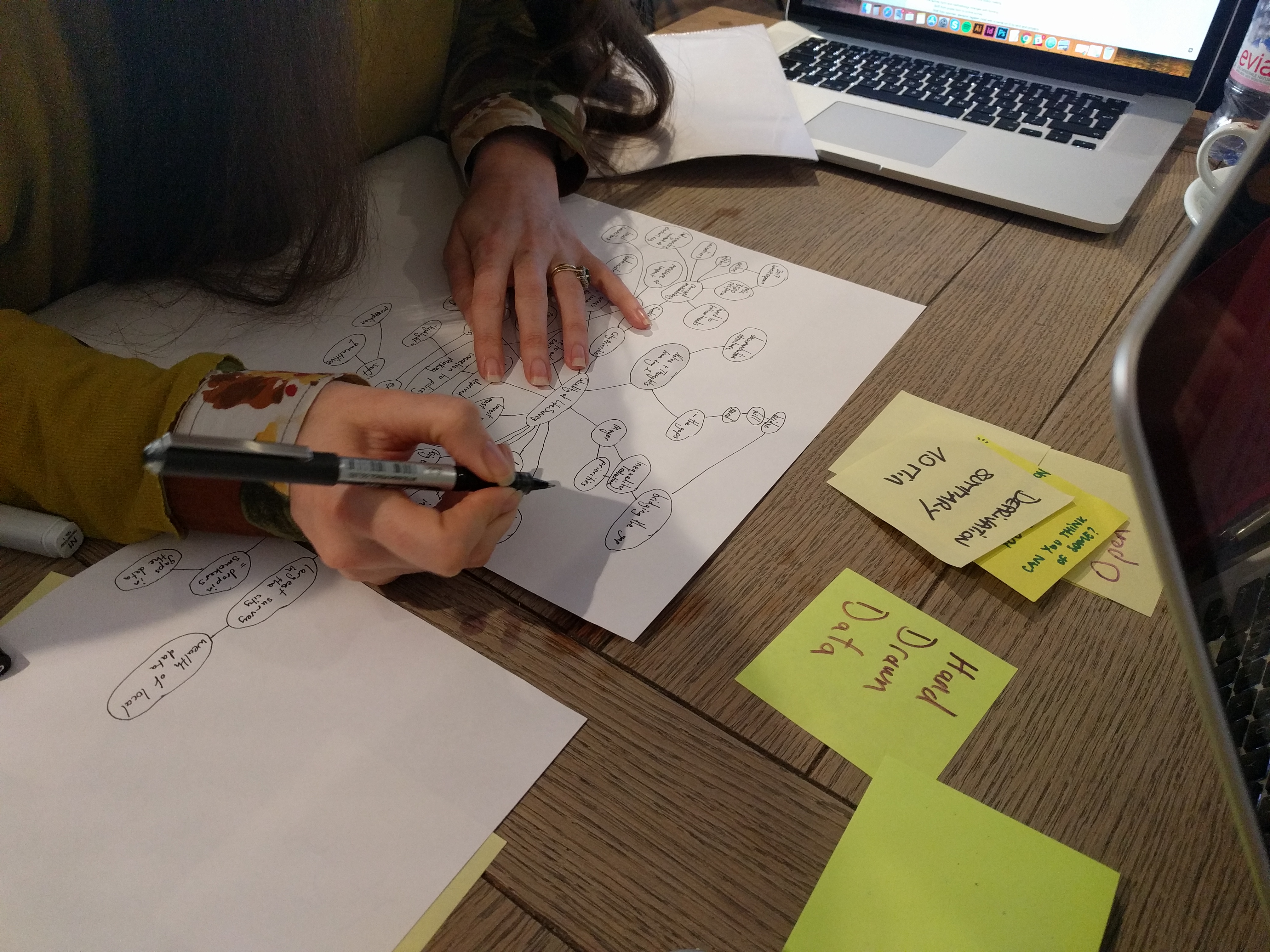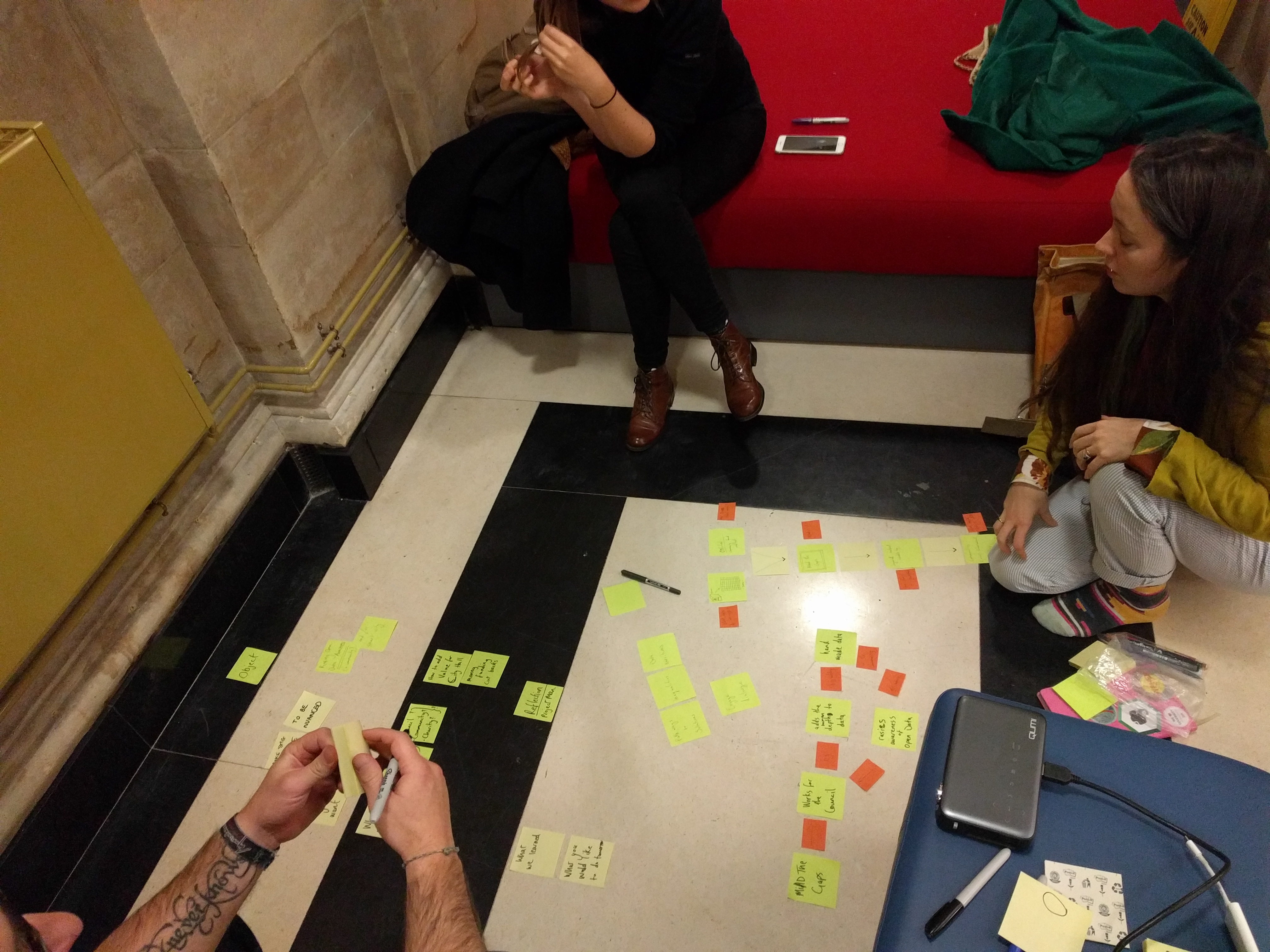Diary of day 2 • Southville
Program of the day:
- 9.00 - Get in touch with Knowle West Media Centre
- 10.00 - Share data visualisations
- 10.45 - Synthesis of yesterday’s interviews at (Watershed)[www.watershed.co.uk]
- 13.00 - Lunch at Wokyko
- 14.00 - Walk in Southville, get a feel of the city in different areas and collecting visual material.
- 15.00 - Sentence game around the project. ‘Mind the Gaps is…’ at BS3 Community Centre’s cafe.
- 15.30 - Guerilla interviews in BS3 Community Centre
- 17.00 - Project solidification - ideation at Bristol City Council
- 18.00 - Open data community event at Bristol City Council
- 20.00 - Dinner at Clifton Village Fish Bar.
- 22.00 - Team retrospective
Work week pro tip - get in touch with people as soon as you can!
If you manage to talk to the right people at the start of the project, you can learn a wealth of invaluable things that will inform your project. As soon as you identify them, get in touch. Don’t leave it to later. People are busy, and it’ll likely take a few days to get to the right person and fit a session in their schedule.
→ Why the Knowle West Media Centre?
We’ve heard so many great things about their community activism and local anchorage from a variety of people. We can’t wait to meet them. They seem like trailblazers, and a reference in the field.
Workshop 1 - Share examples of data visualisations
We nip to the Watershed for our morning session.
To find out what each member of the team has in mind when they talk about data visualisations, we decide to spend a little time expanding our horizons and sharing links.
What comes out of this session is that we were all interested in how data materialises.
Whether that translates into a web page using graphics to represent volume like this article in the New York Times, the Dear Data project we all hold as a reference for questioning common perceptions of data as impersonal and abstract.
Interesting use of analog representations of data seemed the most interesting and striking.
Ai Wei Wei’s Straight shown at his major retrospective at the Royal Academy in 2015 materialises the death toll of children in a quake that destroyed 20 schools on a seismic faultline. The walls display a de-personalised list of 5,000 victims’ names, and on the ground, wiring from the construction has been bought and re-straightened to their original shape.
Considering Bristol’s strong history in social activism, tight-knit communities and attachment to street art, Jose Duarte’s Data in the Street, by hand seemed an interesting participatory format.
Workshop 2 - Synthesizing notes from the previous day
We’ve absorbed a lot of information on the multiple initiatives that drive innovation within Bristol. Council initiatives, in collaboration with industry partners, and a vibrant community of social activism. A great opportunity for Alaine to draw a mind map as we go along.

Break for lunch at Wokyko
Recommend their green curry and cheung fung. Delish.
Field trip in Southville
If we’re going to do a project about surfacing inequalities in cities, we might as well get to know the city a little bit better.
We’ve heard a lot about ‘deprivation’ in meetings with the City Council. An index has identified factors - see the Index of Multiple Deprivation.
Historically, the South of Bristol is less well-off than the centre, and we’re anxious to get a feel for what that means, and leave the polished landscapes.
We travel around Southville and loop to the BS3 Community centre.
BS3 Community Centre
Based on what we learned from the Council, has the project evolved in our minds? We play ‘Mind the gaps is…’ To align and do rapid-fire word associations. Does anything new surface?
We experience a flood of parents and children out from school! Perfect opportunity to conduct some guerilla interviews. We speak with the front of desk person at the Community Centre, but also to a few parents.
Ideation - Project solidification
We arrive a little early to attend the Open Data Community event at the City Council.
We find a small booth to align on project visions. Is Mind the Gaps : guidelines? data standards? a survey? a data visualisation? workshops? all of these?

Open Data Community Meetup summary
New platform - migration to a system powered by Opendatasoft
Presentation of features and feedback. “Request a data set” feature is felt to be missing.
Which open data sets? To do what? What does the public want to know?
There doesn’t seem to be a consensus or any notable topics that would be logical to tackle first. Sensors for air and water quality, and transport monitoring come back most often in discussions but there’s a lingering
Challenges
There’s no standard for publishers to understand the best format to publish data. What would their incentive be to publish data? Which data sets should be regularly updated? How can users let a publisher know they’d like to request more regular updates?
End of day
We treat ourselves to some of the best fish and chips in town at the Clifton Village Fish Bar.
Bit of team vertigo - we are approaching the tip of the double diamond shape.
We retrospect once we get back home.